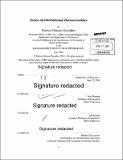Essays on international macroeconomics
Author(s)
Gómez-González, Patricia; Rees, Daniel
DownloadFull printable version (6.281Mb)
Other Contributors
Massachusetts Institute of Technology. Department of Economics.
Advisor
Iván Werning and Alp Simsek.
Terms of use
Metadata
Show full item recordAbstract
This thesis examines several aspects of open economies. The first two chapters are about sovereign debt and its interactions with domestic financial markets. The third chapter, coauthored with my classmate Daniel Rees, studies volatility in terms of trade. The first chapter studies how the introduction of new assets in sovereign debt markets can increase a country's level of investment and welfare. In the model presented in this chapter public debt has a liquidity purpose for the domestic private sector and is demanded as a saving vehicle by more patient international investors. The government commits to repay but is constrained by its fiscal capacity which is low when the private sector needs outside liquidity. I find that the government can increase domestic investment by tranching its fiscal capacity, increasing the number of assets supplied and introducing state-contingency or safe assets. In this chapter I also test the predictions of the model and find that domestic collateral constraints and international discount factor both play a significant role in determining the share of public debt held by non-residents and that there is a significant differential effect for countries that have introduced more financial innovation in sovereign debt markets. The second chapter studies the implications of bailout policy tools for sovereign default and public default risk in a model where, similarly to chapter 1, public debt has a liquidity purpose in financial markets. In this chapter, I show that the government might default for strategic reasons if it can bailout its financial system. It does so when investment and output are low in the economy and when available credit in financial markets is below optimal. The model in this chapter delivers the empirical evidence that financial crises precede sovereign debt crises and it generates the qualitative evidence that, first, private credit drops before sovereign defaults, second, government defaults in periods of low output and, finally, bailout policies affect public debt sustainability. The third chapter, co-authored with my classmate Daniel Rees, examines the consequences of changes in the volatility of commodity price shocks on commodity exporters. We first demonstrate the existence of time-varying volatility in the terms of trade of a selection of commodity-exporting small open economies. We then show empirically that increases in terms of trade volatility trigger a contraction in domestic consumption and investment and an improvement in the trade balance in these economies. Finally, we construct a theoretical model and demonstrate that it can replicate our empirical results.
Description
Thesis: Ph. D., Massachusetts Institute of Technology, Department of Economics, 2014. Cataloged from PDF version of thesis. Includes bibliographical references (pages 141-149).
Date issued
2014Department
Massachusetts Institute of Technology. Department of EconomicsPublisher
Massachusetts Institute of Technology
Keywords
Economics.